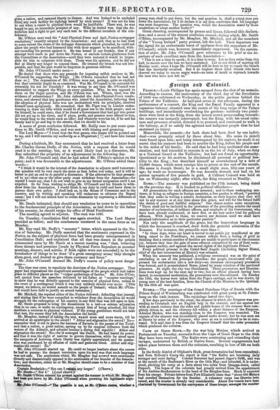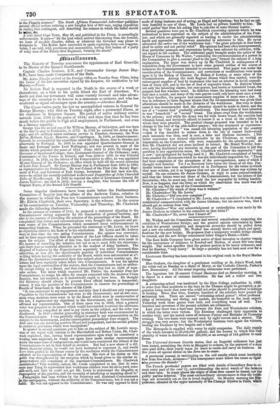,Foreign ant: (Colonial.
Fa iarcz.—Louis Philippe has again escaped from the shot of an assassin. According to custom, the anniversary of the third day of the Revolution of 1830 was celebrated, on Wednesday, in the public gardens behind the Palace of the Tuilleries. At half-past seven in the afternoon, during the performance of a concert, the King and the Royal Family appeared in a capacious balcony, situated near the centre of the long range of the Palace buildings, and immediately overlooking the gardens: suddenly two pistol- shots were fired at the King, from the mixed crowd promenading beneath: the concert was instantly interrupted; but the King, with his usual calm- ness and presence of mind, directed it to proceed, and continued to walk in the balcony, as if to satisfy the agitated and indignant people that he had sustained no injury. Meanwhile, the assassin—for both shots had been fired by one indivi- dual—was promptly seized by those about him. His arms (a pistol) were found upon him; and being interrogated by his captors, he made it no secret that his purpose had been to murder the King, before his people and in the midst of his family. He said that he had long meditated the assas- sination; and had intended to execute it on the 1st of July, when on duty as a National Guard at the Tuilleries; but had not found an opportunity. Questioned as to his motives, he disclaimed all personal or political Mo- tility to the. King ; but described himself as' overwhelmed by a debt of 15,000 francs, which must consign him to prison at the end of the month. His name is Joseph Henri; he is a small slight man, fifty-one years of age; by trade an ironmonger. He was decently dressed, and had on his person upwards of five pounds in gold. A Cabinet Connell was held at ten on Wednesday night; after which, the King returned to Neuilly.
Roraz.--The amnesty was Published on the 17th instant, being dated on the previous day. It is limited to political offenders— All prosecutions for such offences are arrested; and to those undergoing sen- tence, or living as refugees in foreign countries, a free pardon is offered, "provided that they make in writing a solemn declaration, on their honour, that they will not in any manner or at any time abuse this grace, and will for the future fulfil the duties of good and faithful subjects." One clause makes some exceptions. "There shall not be included in the provisions of the preceding articles the small number of ecclesiastics, of military officers, and employes of the Government, who have been already condemned, or have fled, or are now under trial for political offences. With regard to those, we reserve our decision until we shall have obtained information as to their Particular position." Not only the amplitude of the grace, but the benevolent language in which the document is couched, drew forth the grateful admiration of the Romans. For instance, the preamble runs thus---
"In these days, when our heart is moved to see public joy manifested at our being raised to the Pontificate, we cannot refrain from a feeling of grief in thinking that a certain number of families are unable to participate in the common joy, because they bear the pain of some offences committed by one of their mem- bers against society, and against the sacred rightii of the legitimate Prince."
Every political prisoner in the Castel Sant' Angelo (including Signor Rienzi, chief of the last insurrection g Rimini) was released. . When the amnesty was published, a religions ceremonial was on the point, of concluding in one of the principal churches: the people, intoxicated with joy, i
pressed the ecclesiastics into a new duty—an immense extemporary procession was formed, and it perambulated Rome, pined by many relatives of the pardoned prisoners. At night the city was illuminated. :These processions and illumina- tions were kept up for the next day or two; but an official placard havind been issued, to recommend moderation, the processions were discontinued. On Stinday the 19th, the horses were taken from the Pope's carriage, and he was drawn, by young men of the best families, from the Church of the Missions to the QuirinaL By the 20th all was quiet.
Russo..—The marriage of the Grand Dutchess Olga of Russia with the Prince Royal of Wurtemberg was celebrated with great pomp at St. Peters- burg on the 14th instant. The rejoicings lasted two days. A few days previously to the event, the steamer in which the Emperor was pro- ceeding to Cronstadt met an English brig in the channel, and ran against her with so much violence that the sides and paddle-boxes of the steamer were com- pletely driven in. and the chimney fell within a short distance of the Emperor. Admiral Meiden, who was standing close to the Emperor, was wounded. The captain of the steamer was immediately placed under arrest; but he was soon set at liberty by order of the Emperor, who even at sea is considered to be in com- mand. It is said that it was from the Emperor himself that the order prooeeded which produced the collision.
CAFE OF GOOD Hors.—By the war-brig Mutine, which arrived at Portsmouth on Tuesday, accounts from the Cape of Good Hope to the 30th May have been received. The Kafirs were continuing and extending their ravages, undeterred by British or Native force. Several engagements had taken place between them and the colonists, resulting in loss of life on both sides.
In the fertile district of Oliphant's Hock, great devastation had been committed; and from Sidbnry's Cams, the report is that "the Kafirs are becoming daily stronger and more daring. Colonel Somerset had passed Jager's Drift, and was at the mouth of the Bushman's River on the 16th bhy; and intended, it is under- stood, pitching his camp at a farm about two miles from Quagga-mats, called Depoort. The hopes of the colonists had greatly revived from the appointment of Sir Andries Stockenstrom to the head of the Burgher force. Much is expected from his energy. Private letters from Port Elizabeth state that "about 600 Malays had enrolled themselves for the frontier. A volunteer corps has likewise been raised, and the muster is already very considerable. About five vessels have been chartered by Government for the conveyance of these troops; amongst the number is the Phainix steamer.° The South African Commercial Advertiser publishes several official notices ordering a new burgher levy of 800 men, urging expedition in raising that contingent, and describing the manner in which the ballot should be liken, &c. A note dated Cape Town, May 28, and published in the Times, is exceedingly unfavourable. It says—" By the post which arrived this evening from the frontier, we learn of another disaster, defeat, or whatever the Governor may please to designate it. The Kafirs have succeeded in again capturing forty-one waggons, laden, I am told, with provisions and ammunition, having first beaten off a party of sixty men of the Ninety-first Regiment, forming the escort."



























 Previous page
Previous page